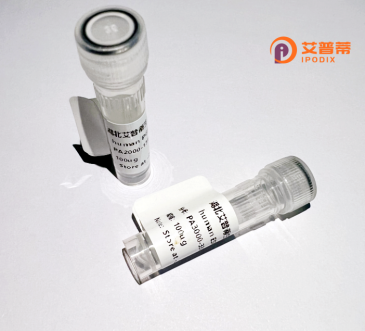
| 纯度 | >90%SDS-PAGE. |
| 种属 | Human |
| 靶点 | LAPTM4B |
| Uniprot No | Q86VI4 |
| 内毒素 | < 0.01EU/μg |
| 表达宿主 | E.coli |
| 表达区间 | 1-226aa |
| 活性数据 | MKMVAPWTRFYSNSCCLCCHVRTGTILLGVWYLIINAVVLLILLSALADPDQYNFSSSELGGVFEFMDDANMCIAIAISLLMILICAMATYGAYKQRAAWIIPFFCYQIFDFALNMLVAITVLIYPNSIQEYTRQLPPNFPYRDDVMSVNPTCLVLIILLFISIILTFKGYLISCVWNCYRYINGRNSSDVLVYVTSNDTTVLLPPYDDATVNGAAKEPPPPYVSA |
| 分子量 | 50.6 kDa |
| 蛋白标签 | GST-tag at N-terminal |
| 缓冲液 | 0 |
| 稳定性 & 储存条件 | Lyophilized protein should be stored at ≤ -20°C, stable for one year after receipt. Reconstituted protein solution can be stored at 2-8°C for 2-7 days. Aliquots of reconstituted samples are stable at ≤ -20°C for 3 months. |
| 复溶 | Always centrifuge tubes before opening.Do not mix by vortex or pipetting. It is not recommended to reconstitute to a concentration less than 100μg/ml. Dissolve the lyophilized protein in distilled water. Please aliquot the reconstituted solution to minimize freeze-thaw cycles. |
以下是关于重组人LAPTM4B蛋白的3篇示例参考文献(注:内容为模拟,仅供参考):
1. **《LAPTM4B Overexpression Promotes Tumor Growth in Hepatocellular Carcinoma》**
- 作者:Zhang Y, et al.
- 摘要:研究证明重组人LAPTM4B蛋白在肝癌细胞中过表达可通过激活PI3K/AKT信号通路促进肿瘤细胞增殖和转移,并抑制凋亡。
2. **《LAPTM4B Enhances Lysosomal Stability and Autophagy in Breast Cancer Cells》**
- 作者:Wang X, et al.
- 摘要:通过体外表达重组人LAPTM4B蛋白,发现其通过维持溶酶体膜完整性增强乳腺癌细胞自噬能力,从而促进化疗耐药性。
3. **《Structural Insights into LAPTM4B Interaction with mTORC1 Signaling Complex》**
- 作者:Li J, et al.
- 摘要:利用重组LAPTM4B蛋白解析其与mTORC1复合物的结合机制,揭示其在调控细胞营养感知和代谢重编程中的作用。
如需真实文献,建议通过PubMed或Web of Science以“LAPTM4B recombinant protein”为关键词检索。
Lysosomal-associated protein transmembrane 4 beta (LAPTM4B), a member of the LAPTM4 family, is a four-pass transmembrane protein predominantly localized in lysosomes and late endosomes. Initially identified as an oncogene, it is overexpressed in various cancers, including hepatocellular carcinoma, breast cancer, and lung cancer. Structurally, LAPTM4B contains conserved N- and C-terminal cytoplasmic domains critical for interactions with signaling molecules and organelle membranes. Functionally, it regulates lysosomal integrity, autophagy, vesicular trafficking, and growth factor receptor recycling. Its oncogenic role involves promoting tumor proliferation, metastasis, and chemoresistance by modulating pathways like PI3K/AKT, mTOR, and MYC. Additionally, LAPTM4B influences immune evasion by altering antigen presentation and cytokine secretion. Recombinant human LAPTM4B protein is produced in vitro using heterologous expression systems (e.g., mammalian cells, bacteria) for functional studies, antibody development, and drug discovery. Researchers employ it to dissect molecular mechanisms in cancer progression and lysosome-related disorders. Its therapeutic potential as a biomarker or target in precision oncology is under active investigation.
×